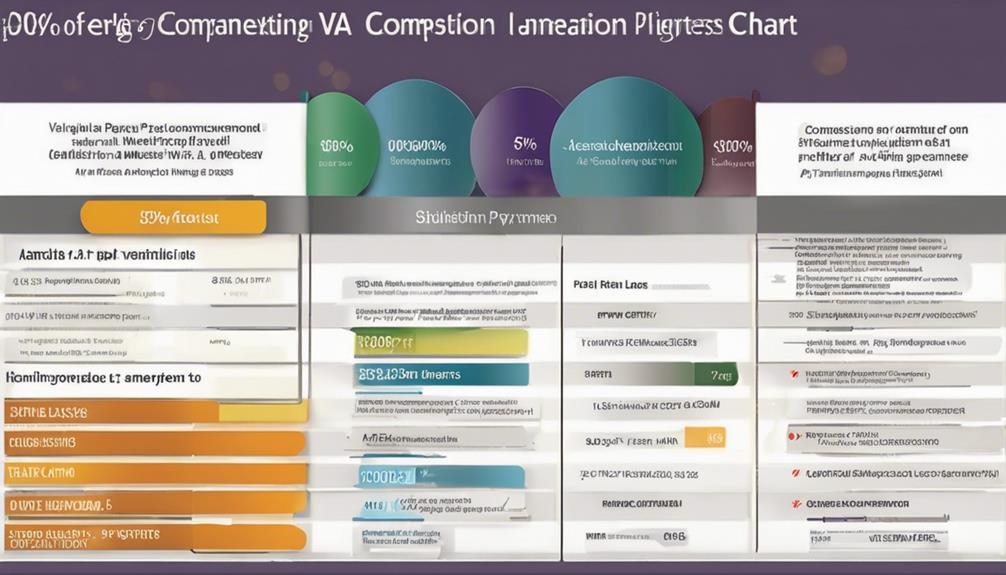Imagine being in a crowded room, trying to make out a conversation over the noise. Now, picture navigating the complexities of VA compensation for hearing loss all on your own.
As veterans ourselves, we understand the importance of unraveling the intricacies of benefits.
There's a crucial key to unlocking the doors to these benefits that we'll reveal, shedding light on how to overcome hurdles and secure the support you deserve.
Key Takeaways
- Establish service connection with medical evidence
- Understand VA disability ratings for fair compensation
- Access TDIU benefits with required disability ratings
- Seek legal assistance for navigating the application process
Eligibility Requirements for VA Compensation
To qualify for VA compensation for hearing loss, veterans must establish a direct service connection demonstrating the link between their current diagnosis and military service. This requires meeting specific eligibility requirements, including providing evidence of in-service events that may have contributed to hearing loss, obtaining a current diagnosis of hearing impairment, and securing a medical opinion connecting the hearing impairment to military service.
Veterans may need to undergo tests such as the Maryland CNC Test and Puretone Audiometric Test to further support their claim for VA compensation for hearing loss. Additionally, lay testimony from veterans or family members can offer valuable supporting evidence to help establish eligibility.
Successfully meeting the requirements for VA compensation for hearing loss involves presenting comprehensive medical documentation and supporting evidence that clearly show the impact of military service on the current hearing impairment. By fulfilling these criteria, veterans can strengthen their case and improve their chances of receiving the benefits they deserve.
Application Process for Hearing Loss Benefits

When applying for hearing loss benefits from the VA, veterans must establish a clear connection between their current diagnosis and the noise exposure or events experienced during their military service.
To navigate the application process effectively, veterans should consider the following steps:
- Submit Evidence of Noise Exposure: Provide documentation of in-service noise exposure or events that led to hearing loss. This evidence is crucial for establishing a direct service connection.
- Undergo Specific Hearing Tests: Take tests like the Maryland CNC Test and Puretone Audiometric Test to support the diagnosis of hearing loss. These tests provide objective data for the VA to assess eligibility for benefits.
- Seek Legal Assistance: Consider consulting veteran-owned law firms such as the Karl Truman Law Office for guidance in preparing your claim. Legal professionals can help veterans gather necessary documentation and present a strong case to maximize their chances of receiving the hearing loss benefits they deserve.
VA Disability Ratings for Hearing Loss
VA Disability ratings for hearing loss are determined based on Diagnostic Code 6100, which ranges from 0% to 100%. This code is used to assess the severity of hearing loss and its impact on an individual's daily life. The VA rates hearing loss and tinnitus separately, with tinnitus being eligible for a 10% disability rating. It's important to note that changes in the rating criteria for tinnitus are expected in the near future.
When applying for VA benefits related to hearing loss, it's crucial to establish a service connection, demonstrating that the hearing loss occurred or was aggravated during military service. The average VA disability rating for hearing loss is 10%, but individual ratings vary based on the severity of the condition. By understanding the Diagnostic Code 6100 and the specific criteria used by the VA for rating hearing loss, veterans can better navigate the process of obtaining fair VA compensation for their hearing-related disabilities.
Compensation Levels for Hearing Loss

The compensation levels for hearing loss vary based on the severity of the condition, ranging from 0% to 100% under the VA disability rating system. When it comes to understanding VA ratings for hearing loss, here are some key points to keep in mind:
- Rating Range: VA disability ratings for hearing loss can range from 0% to 100%, with the average rating being 10%, reflecting the prevalence of this disability among veterans.
- Tinnitus Consideration: Tinnitus, often linked with hearing loss, can be rated separately at 10% disability by the VA, impacting veterans' overall compensation levels.
- Anticipated Changes: Potential changes in the rating criteria for tinnitus are on the horizon, which could affect how veterans' disability benefits are calculated.
It's essential for veterans to be aware of the specific rating criteria for both hearing loss and tinnitus to ensure they receive the compensation levels they're entitled to under the VA disability rating system.
How to Access TDIU Benefits
Navigating the process to access Total Disability Individual Unemployability (TDIU) benefits requires veterans to meet specific eligibility criteria based on their service-connected disabilities. TDIU benefits provide compensation at the 100% disability rate for veterans unable to work due to their service-connected disabilities.
To qualify for TDIU benefits, veterans must have one service-connected disability rated at 60% or multiple disabilities with a combined rating of 70% or higher. These benefits offer financial stability for veterans who can't secure or maintain gainful employment due to their service-related conditions.
Veterans seeking TDIU benefits can apply through the VA by submitting VA Form 21-8940, along with supporting medical evidence and their employment history. By applying for TDIU benefits, veterans can ensure they receive adequate compensation for their sacrifices and the challenges they face in the workforce due to their service-connected disabilities.
Frequently Asked Questions
What Amount of Hearing Loss Qualifies for VA Disability?
We qualify for VA disability benefits for hearing loss when measurable hearing loss is present in one or both ears. The severity is determined through audiometric tests measuring pure tone thresholds. Ratings range from 0% to 100%, with differing levels based on the impairment extent.
Profound hearing loss in both ears may mean a 100% disability rating. Objective test results are used by the VA to assess eligibility for compensation benefits.
What Is the Relationship Between Hearing Loss and Tinnitus?
The relationship between hearing loss and tinnitus is often interconnected. Tinnitus, characterized by ringing, buzzing, or hissing in the ears, frequently accompanies varying degrees of hearing loss.
In many cases, exposure to loud noises during military service can lead to both conditions. Understanding this connection is crucial for veterans seeking VA disability benefits.
Is 30% Hearing Loss a Disability?
Indeed, 30% hearing loss is considered a disability by the VA, impacting daily life and communication abilities. This rating signifies a moderate level of impairment, qualifying veterans for compensation and support.
It reflects the seriousness of the condition and the challenges individuals may face in various environments. Veterans with a 30% hearing loss rating are eligible for benefits to assist in managing their disability.
Is Tinnitus Conductive or Sensorineural?
Tinnitus can be either conductive or sensorineural, depending on its underlying cause. Conductive tinnitus stems from issues in the outer or middle ear that affect sound transmission.
On the other hand, sensorineural tinnitus is linked to damage in the inner ear or auditory nerve, impacting sound perception. Understanding whether tinnitus is conductive or sensorineural is crucial for determining the appropriate management and treatment strategies.
Conclusion
As veterans, we must navigate the complexities of proving service-related hearing loss to secure the benefits we deserve.
Like tuning a radio to find the right frequency, we must fine-tune our claims with precision and perseverance.
By understanding the criteria, tests, and ratings involved, we can amplify our chances of success in receiving VA compensation.
Let's tune into the resources available and harmonize our efforts to ensure our voices are heard and valued.










